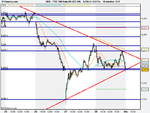Dentalfloss
Legendary member
- Messages
- 63,404
- Likes
- 3,726
Re: Wallstreet1928 Analysis & live calls on FTSE,DAX,S&P...aimed to help New traders
SINGAPORE (MarketWatch) -- Asian shares were mostly higher Tuesday, with exporters recovering in Japan as the yen fell on expectations the Bank of Japan Bank may consider further steps to ease monetary policy at an unscheduled meeting later in the day.
Japan's Nikkei 225 was up 1.7% with Australia's S&P/ASX 200 up 0.1% and South Korea's Kospi Composite 0.7% higher. Hong Kong's Hang Seng Index gained 0.7% while the Shanghai Composite was down 0.2% and Taiwan's main index up 0.7%. Dow Jones Industrial Average futures were 11 points lower in screen trade.
While fears over contagion from Dubai World's debt woes continued to recede, buyers were somewhat sidelined.
Analysts said the markets were now looking for fresh catalysts after recovering from the Dubai shock although some caution was expected as holiday spending figures in the U.S. looked limp.
"Black Friday weekend sales won't likely provide any fresh momentum...as average spending fell from a year ago, indicating U.S. consumers are still reluctant to open their wallets," said Jung Seung-jae at Mirae Asset Securities.
Foreign exchange markets kicked into action in late morning trade on news the Bank of Japan will hold a previously unscheduled monetary policy meeting from 0500 GMT. The dollar rose sharply against the yen, heading above Y87 as traders speculated that the BOJ may adopt further monetary easing measures.
Finance Minister Hirohisa Fujii earlier Tuesday pressured the BOJ adopt such a "quantitative easing" policy, saying it would have a positive impact on the nation's economy. The central bank "should make its own decisions and cooperate with government policy" and reintroducing quantitative easing would have "positive effects," Fujii told a regular press conference.
Exporters reversed earlier losses and were higher on the yen's slide, with Sony up 0.9%, Canon up 1.1% and Toyota Motor 2.6% higher.
Mitsubishi UFJ Financial Group was up 2.0% in heavy volume after Monday saying it will raise up to Y1.056 trillion ($12.24 billion) by issuing new shares, including an over-allotment option, in what would be the biggest-ever share sale by a Japanese financial institution.
Japan's largest bank by assets and market capitalization had already announced a plan to raise up to Y1 trillion by issuing common shares earlier last month.
In China, Zijin Mining Group jumped 9.1% after the gold producer said it has signed agreement with Indophil Resources NL to take over the Melbourne-based company for A$545 million. "This will give them (Zijin) larger access to gold resources in south east Asia," said Essence Securities chief analyst Heng Kun
SINGAPORE (MarketWatch) -- Asian shares were mostly higher Tuesday, with exporters recovering in Japan as the yen fell on expectations the Bank of Japan Bank may consider further steps to ease monetary policy at an unscheduled meeting later in the day.
Japan's Nikkei 225 was up 1.7% with Australia's S&P/ASX 200 up 0.1% and South Korea's Kospi Composite 0.7% higher. Hong Kong's Hang Seng Index gained 0.7% while the Shanghai Composite was down 0.2% and Taiwan's main index up 0.7%. Dow Jones Industrial Average futures were 11 points lower in screen trade.
While fears over contagion from Dubai World's debt woes continued to recede, buyers were somewhat sidelined.
Analysts said the markets were now looking for fresh catalysts after recovering from the Dubai shock although some caution was expected as holiday spending figures in the U.S. looked limp.
"Black Friday weekend sales won't likely provide any fresh momentum...as average spending fell from a year ago, indicating U.S. consumers are still reluctant to open their wallets," said Jung Seung-jae at Mirae Asset Securities.
Foreign exchange markets kicked into action in late morning trade on news the Bank of Japan will hold a previously unscheduled monetary policy meeting from 0500 GMT. The dollar rose sharply against the yen, heading above Y87 as traders speculated that the BOJ may adopt further monetary easing measures.
Finance Minister Hirohisa Fujii earlier Tuesday pressured the BOJ adopt such a "quantitative easing" policy, saying it would have a positive impact on the nation's economy. The central bank "should make its own decisions and cooperate with government policy" and reintroducing quantitative easing would have "positive effects," Fujii told a regular press conference.
Exporters reversed earlier losses and were higher on the yen's slide, with Sony up 0.9%, Canon up 1.1% and Toyota Motor 2.6% higher.
Mitsubishi UFJ Financial Group was up 2.0% in heavy volume after Monday saying it will raise up to Y1.056 trillion ($12.24 billion) by issuing new shares, including an over-allotment option, in what would be the biggest-ever share sale by a Japanese financial institution.
Japan's largest bank by assets and market capitalization had already announced a plan to raise up to Y1 trillion by issuing common shares earlier last month.
In China, Zijin Mining Group jumped 9.1% after the gold producer said it has signed agreement with Indophil Resources NL to take over the Melbourne-based company for A$545 million. "This will give them (Zijin) larger access to gold resources in south east Asia," said Essence Securities chief analyst Heng Kun





